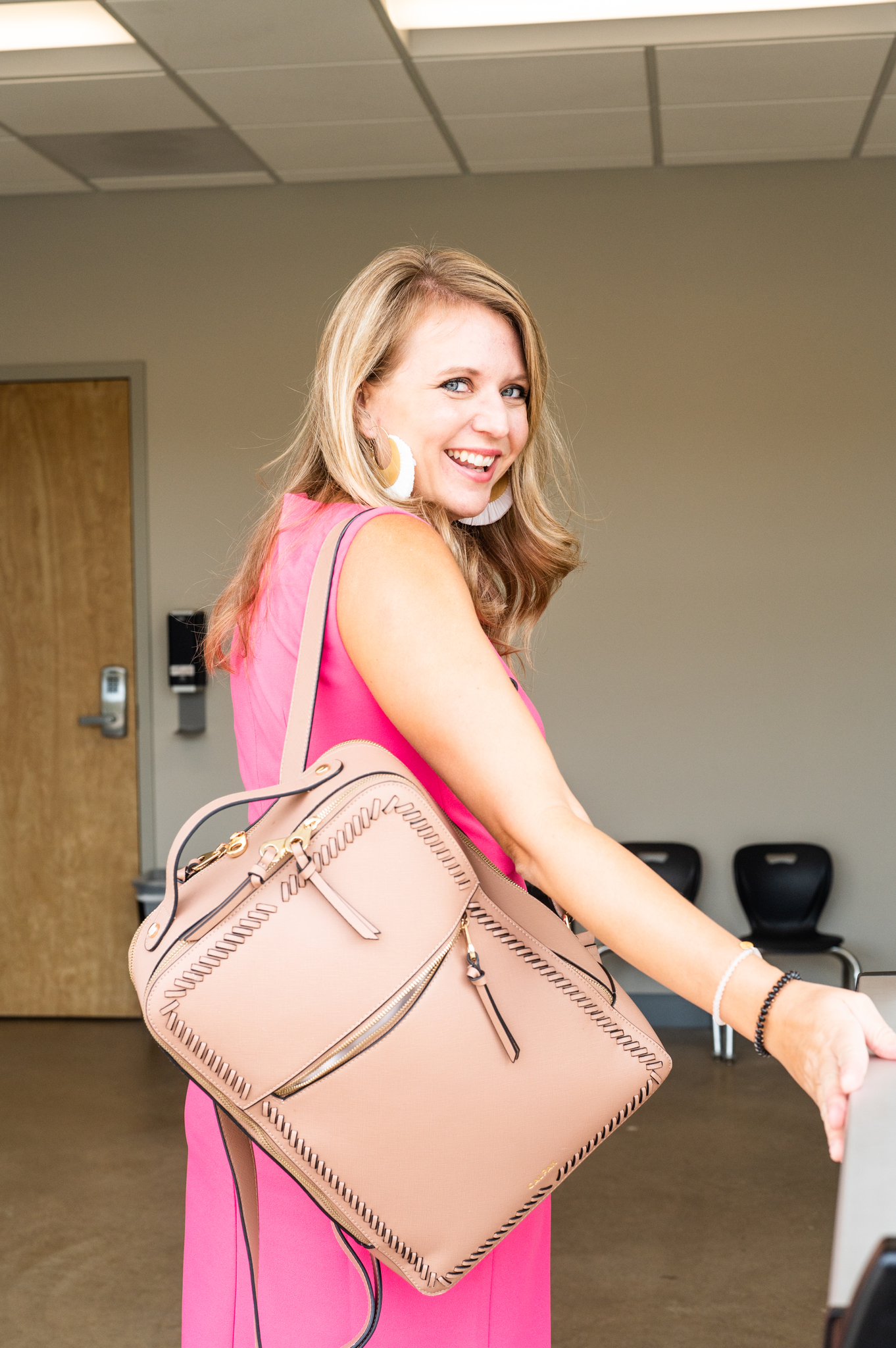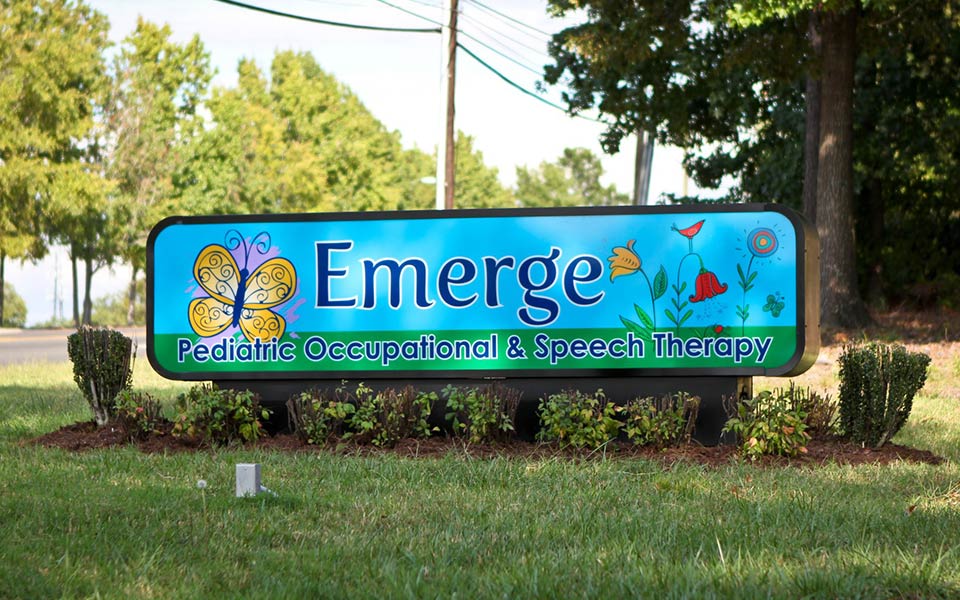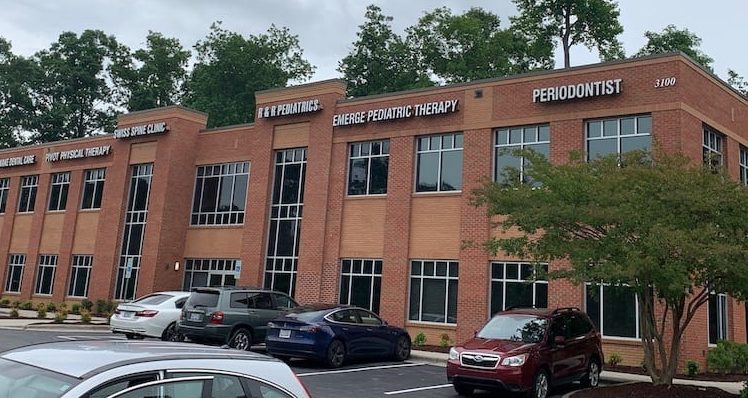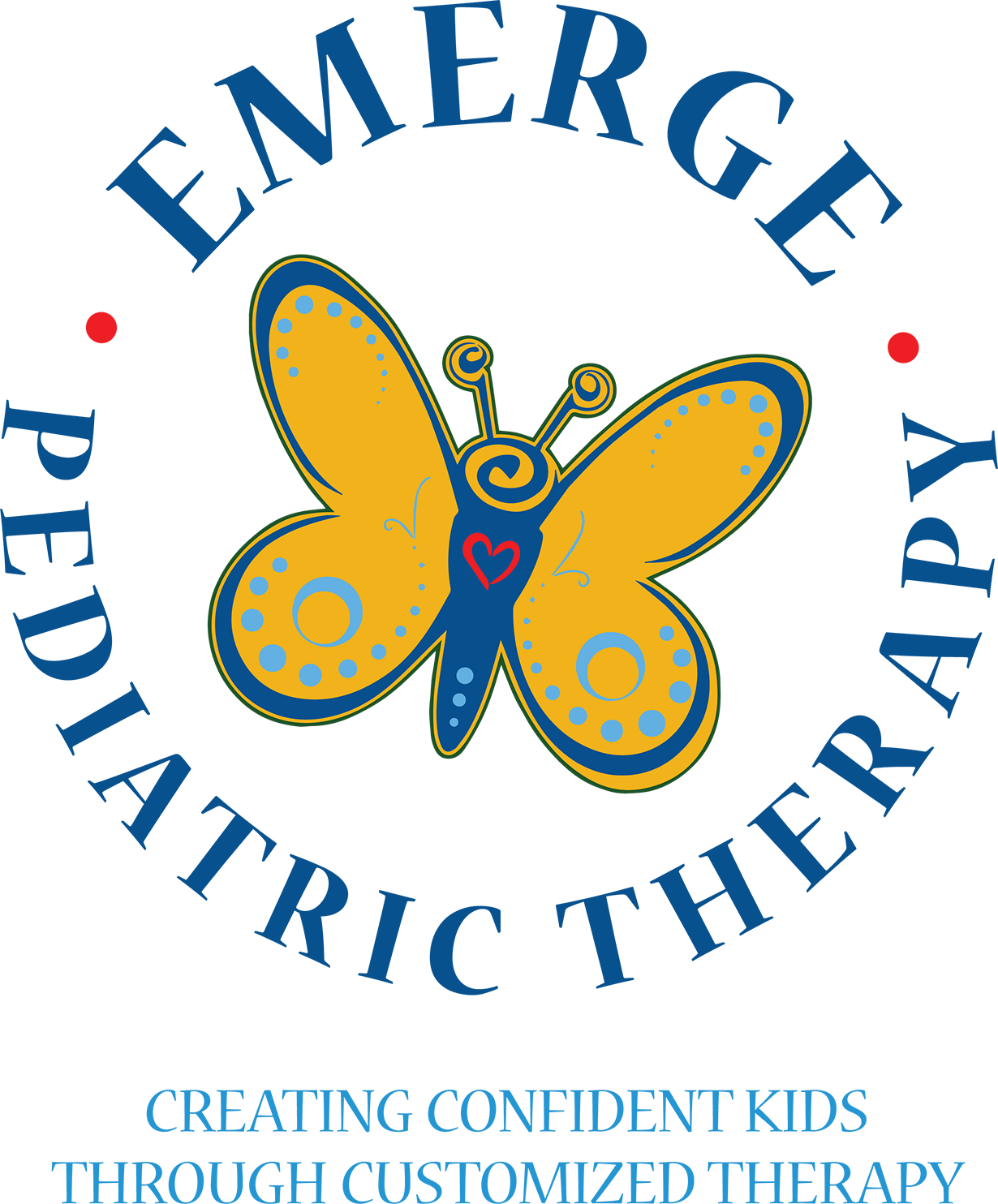Get Started
With three locations ready to serve you, it is even easier to get the help you need. Find us in Durham, Cary, and Carrboro NC.
As simple as Click, Complete, Submit! Once you complete the Initial Inquiry Form our team will reach out to move you closer to answers and actionable support.
A note from the owner, Brittni Winslow:
“As a parent to 3 children, one of whom is neurodiverse, I understand how overwhelming seeking help can be. My team and I are deeply committed to both improving the lives of the children that walk through our doors and to empowering you, the caregiver! Consider us your trusty guides to your child’s development. It is with great enthusiasm that I’d like to say: Welcome to Emerge Pediatric Therapy!”

Parking: Durham
Emerge is located on University Drive, behind the Target at South Square. We have our own private parking lot in front of our building, so parking is never an issue!

Parking: Cary
Emerge’s Cary location is located off NC-55. We have a shared parking lot, with parking spaces right outside our front door. Spaces anywhere in the building’s lot are okay to park in if the spaces in front of our door are full.

Parking: Carrboro
Emerge is located in the South Green shopping center in Carrboro. We have our own private parking lot in front of the building, so parking is never an issue!
110 Two Hills Dr, Carrboro, NC 27510

Practice Portal
Emerge is excited to launch their latest #emergeperk! The Practice Portal! Once set up, families have 24/7 access to reading materials, home exercises, activities, websites, and videos – all hand selected by their therapist! Check out the video below for a preview.
Learn More
Frequently Asked Questions
Occupational Therapy Evaluations
The Clinical Director of Occupational Therapy will help to decide which evaluation option will be right for your child.
Full Evaluation
Lasts about two hours. Typically recommended for children ages 5 and older. Your child will be evaluated using appropriate standardized assessments and a set of clinical observations to better understand your child’s sensory processing (see listed below), motor skills and behavioral organization. Each evaluation is tailored to the specific concerns and child’s needs. Within two weeks of the evaluation, a one-hour caregiver interpretive conference is held to discuss our findings and recommendations. We strongly encourage all primary caregivers to attend the caregiver interpretive, if possible. If you choose, the conference audio can be recorded and given to you at the end of the meeting. A formal report, completed following the caregiver interpretive, is also included detailing all findings as well as recommendations for moving forward.
Standardized Assessments
- Fine Motor, Visual Motor and Gross Motor skills
- Praxis/Motor planning skills
- Postural Stability
- Primary Movement Patterns/Primitive Reflexes
- Vestibular processing (clinical observations and post-rotary nystagmus)
- Proprioceptive processing (clinical observations)
- Sensory sensitivities and/or sensation seeking (clinical observations and caregiver/child interview)
- Attention, focus and behavioral organization
Full Evaluation with a School Visit
In addition to the Full Evaluation and one-hour caregiver interpretive, a one-hour school observation is also included.
Modified Evaluation
Lasts about 90 minutes. Typically recommended for children under the age of 5. Clinical observations for sensory processing and/or motor concerns will be performed, and each evaluation is tailored to the specific concerns and child’s needs. Usually, a standardized assessment is administered. Within two weeks of the evaluation, a one-hour caregiver interpretive is scheduled to discuss our findings and recommendations. If you choose, the conference audio can be recorded and given to you at the end of the meeting. We strongly encourage all primary caregivers to attend the caregiver interpretive, if possible. A formal report is also included, which details all findings as well as recommendations for moving forward. The report is completed after the caregiver interpretive.
Handwriting / Fine Motor Evaluation
Lasts about 90 minutes. Typically recommended for children with specific handwriting / fine motor concerns, when there are no concerns regarding sensory processing, behavioral regulation or gross motor coordination. A standardized assessment, handwriting samples, and clinical observations impacting handwriting / fine motor performance will be performed. A formal report is included, which details all findings as well as recommendations. A caregiver interpretive conference is not included for this evaluation. If the caregivers or therapist see the need for a caregiver interpretive, it will be billed at the typical session rate.
Screening
Lasts about one hour. Screenings are designed to determine whether or not further evaluation is indicated or occasionally to assess a single isolated skill. Clinical observations and sometimes standardized testing will be used to determine functioning in areas of specific concern. A brief report is also included detailing screening findings. A caregiver interpretive conference is not included for this evaluation. If the caregivers or therapist see the need for a caregiver interpretive, it will be billed at the typical session rate.
If a more extensive evaluation is indicated, following the screening, our therapist will suggest the appropriate next steps. If an evaluation is recommended, the screening fee is applied to the cost of the evaluation.
Insurance
If you are a subscriber to one of our in-network insurance plans (Tricare, Medicaid) the evaluation will be limited to 1 hour, due to coverage limitations. These evaluations will be a combination of standardized assessment and clinical observations. A caregiver interpretive meeting is not included, although the therapist may use a portion of your child’s initial session to review the evaluation results with you. A formal written report is included.
Speech & Language Evaluations
Full Speech/Language Evaluation
Typically lasts between 1 ½ – 2 hours. With this evaluation, we are able to obtain a complete picture of language skills (receptive and expressive language, grammar skills, vocabulary, etc.). In addition, we assess articulation, speech fluency, and voice quality.
Articulation Evaluation
Lasts about an hour. We assess speech production of all the sounds of English. In addition, we look at overall intelligibility, oral-motor structure and movements, and the child’s ability to correct his/her production of any error sounds given cueing.
Stuttering Evaluation
Lasts about an hour. Assesses overall speech fluency to determine frequency and severity of repetitions, blocks, interjections, and revisions when answering questions or participating in conversation.
Toddler Evaluation
Lasts about an hour. This evaluation is appropriate for children birth to about three who are referred due to possible delays in language skills (late talking, limited response to questions/directions, delayed play skills, poor interaction with others). The evaluation consists of a caregiver interview, observation of play skills, and interaction during play.
Occupational Therapy Treatment Sessions
Therapy sessions are typically scheduled at the caregiver interpretive or directly following the evaluation. Our therapists tend to have fairly full schedules, so it is advantageous to confirm your child’s therapy sessions as soon as possible. Sessions are typically scheduled once or twice weekly at a re-occuring time. We may be able to schedule back-to-back appointments if your child will receive both occupational and speech therapy. Your child’s therapist will ask for your input on therapy goals and will draft formal short-term and long-term goals with the evaluation report. Occupational therapy sessions are typically scheduled for 45 or 60-minute sessions depending on your child’s age and therapy concerns. Your child’s therapist will provide input and recommendations. Our clinic is play-based and child-centered, so you can rest assured that your child’s therapy session will be fun! We try to draw on the child’s interests and bring in materials and activities that will be motivating while achieving our therapy goals. You will often see us on the floor or engaged with children in movement activities to keep them motivated and involved in the therapy session. We welcome your continued input throughout therapy on goals and activities for your child.
Speech & Language Treatment Sessions
We can schedule therapy sessions, if indicated, after the evaluation is completed to ensure the most flexible scheduling. We may be able to schedule back-to-back appointments if your child will receive both occupational and speech therapy. Your child’s therapist will ask for your input on therapy goals and will draft formal short-term and long-term goals with the evaluation report. Speech/language therapy sessions are scheduled for 30-, 45-, or 60-minute sessions, depending on your child’s age and speech/language concerns. Therapy is typically scheduled once or twice weekly, although it sometimes occurs with a greater or lesser frequency. Your child’s therapist will provide input and recommendations. Speech/language therapy sessions typically take place in one of our smaller therapy rooms or small gyms, depending on your child’s concerns. Caregivers are always welcome in our sessions. Direct caregiver involvement is especially important with younger children in order to facilitate effective home carryover. If you choose not to remain inside the therapy room during your child’s session, you are welcome to watch through the observation window or remain in the waiting room. After the session, your child’s therapist will provide input on your child’s performance and progress during the session, as well as on ways you can carryover therapy techniques at home. Our clinic is play-based and child-centered, so you can rest assured that your child’s therapy session will be fun! We try to draw on the child’s interests and bring in materials and activities that will be motivating while achieving our therapy goals. You will often see us on the floor or engaged with children in movement activities to keep them motivated and involved in the therapy session. We welcome your continued input throughout therapy on goals and activities for your child.

